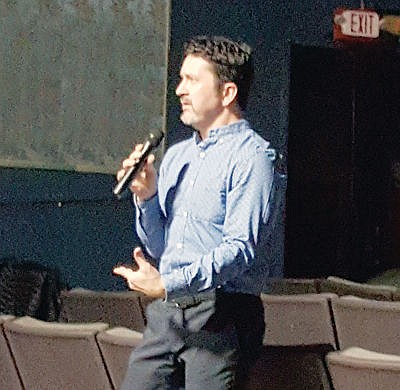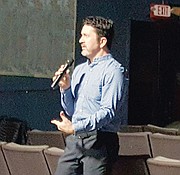Peck unveils new branding plan
More than 125 area residents gathered at the Dome Theater in Libby Wednesday night for an update about Lincoln County’s new brand management project.
The $100,000 effort, said Lincoln County Commissioner Mark Peck, is the first step in a long process for area residents to decide the future of an area that has been at the forefront of national media and buried in the stigma of a long-term Environmental Protection Agency Superfund site.
“Hopefully this is the first of a long-term movement to take control of our own future,” Peck said. “How do we overcome the stigma that Libby has from the Superfund site? How do we right that ship so Libby can move forward and be what it’s going to be?”
The program is being managed by the county commissioners, with the assistance of a committee of local residents put together to provide input and support. The committee includes Commissioner Mark Peck, Libby City Council President Brent Teske, local businesswoman Sarah Sorenson, Lincoln County environmental health technician Jennifer Nelson, Lincoln County Asbestos Resource Program manager Nick Raines, Troy businessman Tim Lindsey, Troy resident and Libby city administrator Jim Hammons and Libby businesswoman Kim Peck. The county hired Missoula public relations firm PartnersCreative to help create the brand. PartnersCreative is a private branding and marketing agency in Missoula. The project is a public-private partnership involving Lincoln County, Kootenai River Development Council, the University of Montana School of Business and PartnersCreative.
The team began gathering information in November 2015 and presented their initial findings to a packed house at the Dome Theater in Libby Wednesday night.
Project leader Kevin Keohane said the group engaged in a number of discussions with area residents in the preliminary stages of developing the brand. They conducted 17 in-depth interviews with individual residents, 81 shorter “intercept” interviews with people on the street and out and about at various locations in Libby and Troy and six group listening sessions, which resulted in an additional 58 survey responses.
The group also looked at other communities in similar situations, communities near Superfund sites and others where large employers have closed, creating economic problems. Understanding what those communities did to overcome the stigma and recover from the setbacks, Keohane said, is crucial to helping south Lincoln County.
Understanding those issues, he said, is a crucial step to building a successful brand. The brand, he said, is more than a logo and a slogan, it’s a promise to visitors and to new residents about what a community is and what it has to offer. Before launching a new brand, the community must be in a position to deliver on that promise. The promise he said, is not of a five-star experience, but of a five billion star experience, showing a slide of a person staring into a star-lit sky.
“Nothing kills a bad product like advertising it,” he said.
According to Keohane, there are several key elements to the brand Partners Creative is developing for south Lincoln County. The first is to highlight the area’s undiscovered opportunities. South Lincoln County, he said, offers a wealth of business, social and recreational opportunities many people don’t know about. Presenting those opportunities to the right people in the right situations could inspire those people to move to the area and to bring their businesses and jobs with them. He highlighted the independent nature of the people of northwest Montana, a “rugged individualism,” he characterized as people who like to be alone, but who also form a tight-knit community of people willing to reach out and help each other in times of need. “Alone. Together,” he called it.
The other key element he discussed was what he termed a return on involvement. The communities of Libby and Troy, he said, return to people what they put into them. The more people choose to be involved in the communities, the more that involvement pays off for them.
All together, he said south Lincoln County is “the right kind of remote,” although use of that slogan, he said, is probably premature.
Of particular importance, both Peck and Keohane stressed, is that Libby and Troy grow and develop while maintaining those elements of their identities.
“It’s not about growth for growth’s sake,” Keohane said. “It’s about growth in a healthy, meaningful, controlled and sustainable way.”
Keohane ended his remarks with what he labeled a reality check.
“It’s easy to create a brand,” he said. “It’s challenging to actually deliver on it.”
The challenge, Commissioner Peck said, is now in the hands of the community. He spoke about groundwork laid by other groups working to promote business and change in the community in past years. He said now is the time for Libby residents to put the past behind them, to end the divisive battles that have for too long torn the community apart.
“To me, this town needs to come together,” he said. “The amount of fracturing and infighting and, I’ll just be blunt, goofy stuff, it has to stop. And not that we’ll all get along and we all have to agree, but, well, we’re all very passionate, but the divisiveness in this town is our own killer.”
He left the attendees wanting more, as evidenced by area resident Dan Ackerman asking Peck to schedule additional meetings to keep the public updated and to “not let the momentum die.”
Local businessman Tom Gilmore said he was “looking forward to moving forward.”
After the meeting some attendees expressed doubt about the next steps in the process, asking how this could be expected to work when other similar actions have fizzled out in the past.
Peck said he wasn’t ready to label any of the past elements as failures, but said this current process was building upon the things gained and learned from earlier endeavors. He said he was amazed at the turnout of the meeting and the passion of the people who attended.
“The success or failure of this is up to us,” he said. “As a community. The timing of this one, with the Superfund starting to wind down, it’s a different town. We have new people here, people ready to take action and make change. There were smart, intelligent, driven people in that room last night, people ready to make positive change. This is more about changing the culture in Libby, it’s about taking control of our own destiny. I encourage everyone to get involved and make a difference.”
Peck said the goal wasn’t to begin action, as the project is still in the early stages, but to begin to engage the community in the discussion. He said that goal was achieved in Wednesday evening’s event.
“The goal of this meeting was to bring people together to start the dialogue,” he said. “To kick it off and get it started. This is about changing the culture and it’s starting.”



